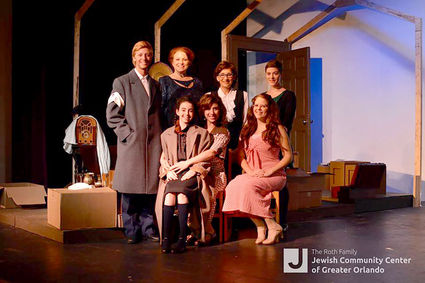Humanizing the Holocaust: 'Kindertransport' by Theater at the J

Amy Schwartz
The cast of "Kindertransport" (seated, l-r) Randi L. Yoffee, Kelly Roth, Bridget Lindsey Morris; (standing, l-r) Sloan Friedman, Cheryl Goldstein Moore, Jackie Levine and Allie Novell at Jewish Community Center of Greater Orlando.
By Caleb R. Newton
Nov. 9, 2015, was the 77th Anniversary of the Night of Broken Glass, known in German as Kristallnacht. Seventy-seven years ago, the Nazis and their comrades stormed through the streets of Germany and German-occupied lands, killing nearly 100 Jews and terrorizing hundreds of thousands more. In humanitarian response, encouraged by groups like the British Committee for the Jews of Germany, the British government allowed the transport of thousands of endangered, mostly Jewish, children from Nazi lands to British soil. The humanitarian response was termed, in German, the Kindertransport.
In commemoration of both the victims of the 1938 Kristallnacht pogrom and the members of the ensuing Kindertransport, on Nov. 8-9, 2015, the Holocaust Memorial Resource and Education Center of Florida and the Theater at the J presented "Kindertransport," a play by Diane Samuels, 1994 recipient of the British Meyer-Whitworth Award. The production is the literary nonfiction story of one of the members of the Kindertransport, named Eva. Starring in the play was Erin Yoffee as the youngest version of Eva; Bridget Morris as the teenaged Eva; and Jackie Levine as adult Evelyn-the British name adopted by Eva over the course of the play. Additionally performing was Cheryl Goldstein Moore as Eva's British adoptive mother; Kelly Roth as Eva's natural mother; and Allie Novell as Eva/Evelyn's adult daughter; with Sloan Friedman as the "Ratcatcher," after a German children's story character, and as other supporting roles.
"Kindertransport" delivers a human perspective that is so often missing in daily activities, let alone in dealings with the subject of the Holocaust. It beautifully and profoundly reminds viewers that those affected by events often related statistically, like Kristallnacht and the Kindertransport, are real and complex people. Such a reminder extends into the viewers' lives as they go on after the play, delivering a forceful reminder of the power of the human perspective.
Researchers such as Leonard Peikoff have documented the lack of human perspective as a significant force behind the Holocaust itself. In the oppression of vast segments of the German population, from those deemed mentally ill to the Jews, the oppression and eventual murder was driven by the replacement of the importance of the status of the individual person with the preeminence of the state. Such philosophy was used as a virulent intellectual front by the Nazis to carry out their personal hatred, since behind the front of an impersonal German state stood the persons of the Nazis.
Beginning to recognize the violently deceptive intellectual backdrop to the Holocaust and its pervasion in the present has driven much of the Holocaust memorial movement with its slogan, "Never Again," which acknowledges that, as Auschwitz Death Camp Survivor Primo Levi stated, "It can happen again, and it can happen anywhere." The reason that it can happen again is because the hatred and degradation of people external to "you and your group" behind it lives on. Showing the human perspective in a story of Kristallnacht undermines the ability for such a dangerous ideology to continue.
"Kindertransport," the play, pleads with the viewer to recognize the personal aspect of issues of societal existence and the targeting of the same in atrocities such as those carried out by the Nazis. Evelyn carries the injury from her experiences for the rest of her life, as portrayed in the play, even while having been saved from the majority of Nazi violence in her escape from Germany on the Kindertransport. Her pain tangibly affects her family members in England. One actress noted her emotional response to the production after the first performance: "I just couldn't stop crying. I would get it together, and then someone would say something to me, and then I would just start again."
The play avoids the easy and clichéd repetition of facts, touching on technical history only briefly. In doing so, the audience's attention is securely focused on the characters with little to no distraction. The play is an extremely effective device for communicating the nature and importance of the human perspective in understanding Kristallnacht, the Kindertransport, and the Holocaust, and the actresses and actor did a very effective job in their performance.
Caleb R. Newton is a global affairs analyst living in Central Florida. Find him at the Times of Israel, Dissecting Society, and Global News Breakdown. Contact him at calebrnewton@globalnewsbreakdown.com.






Reader Comments(0)